Why We Seek Out Video Games
Since the advent of the cathode-ray tube amusement device in 1947, the fusion of play and electronics provided folks with novel tools for crafting one’s vision and rendering it like never before. This included novel ways for folks to interact with one another via leisure.
Enter the world of video games, in which text, images, and sound work to transplant imagination and input into a new plane of reality. It is a plane in which the unreal’s formed not just by the author, but also by those they reach out to. As the years added up, so too have the pixels comprising the unreal.
With technical leaps and a warming view of interactive entertainment on society’s part, gaming shed its image as a childish medium. The result? A multibillion-dollar industry that can host blockbusters like Days Gone (2019) and smaller works such as Return of the Obra Dinn (2018).
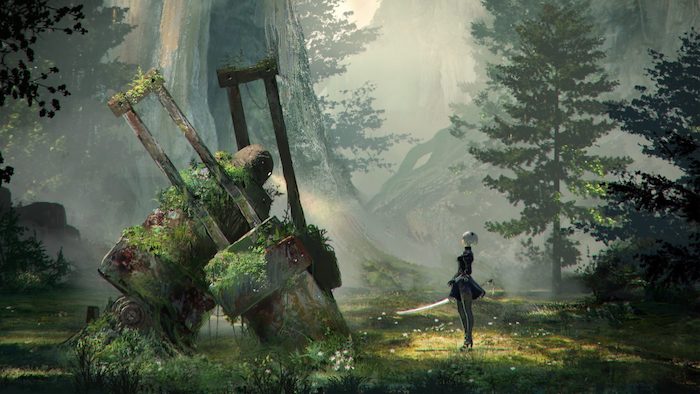
That wave of change brought new, increasing demographics to the medium such as the three billion video game consumers now around the world and the “more than 10 million Americans age 50 and older [who] became active video gamers [from 2016-19].” 1 Suffice it to say that video games are here to stay, with more potential homes—and lives—to set up shop in and enliven.
New setups also expanded the medium’s reach. Consoles and handhelds, motion controls and virtual reality, solo titles and games-as-services… Just as the value of the industry ballooned, so too has gaming’s impact across those demographics looking for controllable escapism in all shapes and sizes.
But games are more than just distractions from daily woes. As an interactive medium, gaming acts as a portal into a realm different from reality and made by developers wishing to share themselves—their imagination made manifest—with others. Those developers entrust audiences with the power to shape said realm and trigger a dialog between creator and consumer in the language of play.
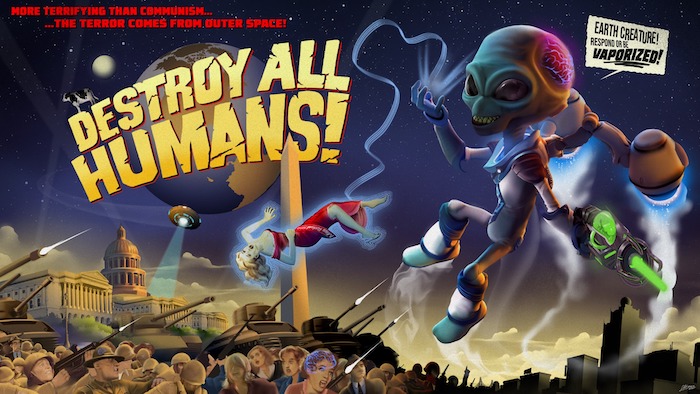
With the ninth console generation settling in and COVID driving folks to seek remote forms of fun, interactive entertainment couldn’t receive a better chance to grasp folks’ attention… and some of their cash to boot.
So why does gaming—a well from which to draw thrills, insight, or both—matter? Why are “people looking to create games that are not just fun to play, but send a message to the player?” 2
To Explore, And Mold, Worlds Our Way
The first aspect of gaming’s appeal lies in the space(s) afforded to the participant. Whether it’s linear or open-ended, bespoke or procedurally generated, dark or colorful, the virtual world offers a break from the real one. It does so with gameplay obstacles (enemies, environmental hazards, etc.) and presentational details (audiovisuals, map layout, in-game lore, and the like) that compel players to engage with their surroundings.
From Assassin’s Creed: Origins‘s (2017) Egypt to Halo‘s (2001) titular ring, the realms carved out with keyboard and Wacom stylus strokes act as fodder for the human impulse to creatively shape and impact one’s environment. Be it via destruction, looting, or skulking through the shadows, how the gamer operates plays a key role in grounding them in the virtual space.
That is, provided the designer accounts for the gameplay possibilities generated by the game engine, as well as for the player’s exercising of game mechanics. For the sake of immersion, any action the gamer thinks of with regards to molding the fictional world—while still respecting the game rules—should be executable.
Few works wield the idea of playing games and God like Garry’s Mod (2006). In this sandbox game, players may freely summon and manipulate characters and objects to toy with across a series of user-created maps and game modes, with or without any set objectives or rules to follow.
Via Havok physics and the gamer’s imagination, Half-Life 2‘s foremost game modification offers the virtual equivalent of a junk playground.
In other words, a playground that “lets players experiment with a wide swath of creative tools and functions to build nearly any kind of experience they can dream up.” 3
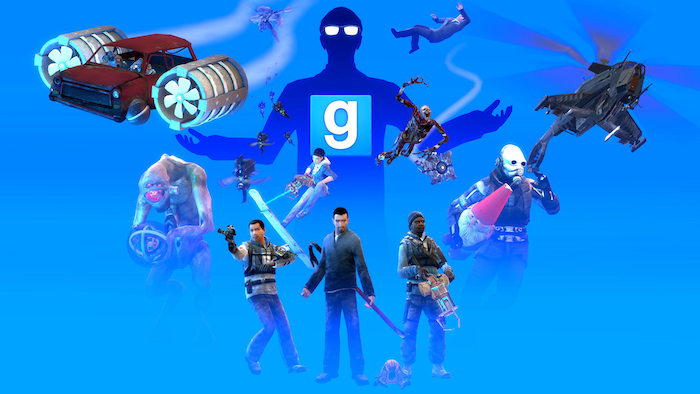
This ability to dream up anything’s facilitated by the openness of maps such as Construct and Flatgrass. And in these, players may wield the multi-purpose Tool Gun to reshape virtual reality (including faces) or spawn random characters and weapons into said reality. All of these can beget all sorts of thrills, including those of playing a game of Prop Hunt that has one evade other players by disguising oneself as an object and hiding in a pirate ship.
Garry’s Mod invites players like how an empty canvas entices the artist to step up, let their thoughts pour out… and duke it out as they spawn into space, BFG-9000s in hand.
Factoring in technical limits and how well it lends itself to the gameplay rules, a virtual space defines a large chunk of the game’s identity. It also lets players define their in-game identity via spatial interactions that hone their playstyle and induce a “breadcrumb trail” effect of perpetual discovery.
For the humble human, discovery drives one forward. It can be on foot, in monster trucks, or on tamed Randy Savage dragons. What better place to find or craft thrills with style and no serious consequences than the world developers make for their stories and that of audiences?

Other Examples: Octodad: Dadliest Catch (2014), Red Faction: Guerilla (2009), Control (2019).
To Become And Meet Folks Unlike Us
A virtual world’s shaped as much by its populace as it is by player input. Enter characters. Be it their boots (avatars) or paths (non-player characters), a game’s cast invites interaction and empathy in a way that goes beyond what’s offered by “slab-shouldered space marines or lingerie models turned ninjas-for-hire.” 4
They can be the product of authorial intent like the party members in The Outer Worlds (2019), or of emergent play such as the Uruks from Middle-earth: Shadow of War (2017). Whether at the player’s or developer’s hand, characters in a game aim to lure the participant into their worlds, acting as ambassadors of sorts for the title’s narrative tone and gameplay style.
And once the luring’s achieved, said characters anchor the audience into the experience with a mix of catching personalities and impressive gameplay abilities that warrant further interaction.
Such interactions can include, in the case of Oddworld: Stranger’s Wrath (2005), catching said personalities or shooting them with personalities that form the game’s Live Ammo (Chippunk, Boombat, and the like).
Throughout his journey across settler towns and abandoned mines, Stranger captures bandits dead or alive to raise enough bounty cash for a mysterious operation that would clear his name and hide his true identity. With their crossbow’s ammo keeping them company, gamers traverse a realm whose Western theme’s the one link to human history.
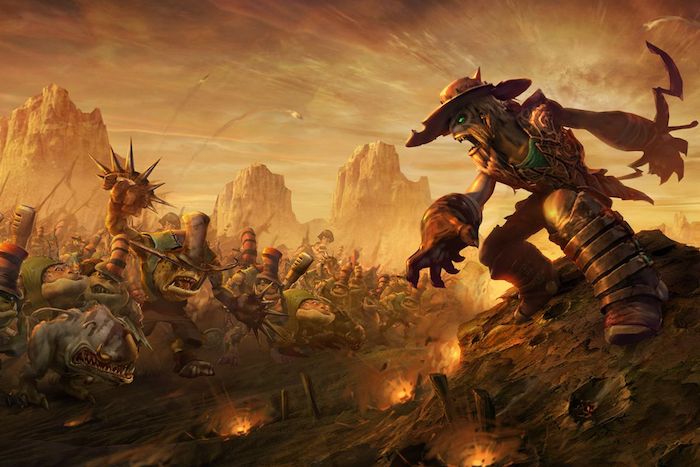
“Everything from the characters’ wardrobe to the dusty towns screams wild frontier.” 5 It can be seen in the clucking Clakkerz in Gizzard Gulch, as well as in the antics of the fiery Flint “Explosives” McGee and matriarchal Jo Mama.
Whether friend or foe, quick or slow on their feet and of judgment, the cast of Stranger’s Wrath hardly breaks a sweat in the offbeat department, both in terms of gameplay tactics and comedic delivery. That the two combine to say something about the characters—like Packrat Palooka’s love of junk that begets statues and cyber minions in his Junkyard—also adds to the cast’s charm.
Coupled with the themes of exploitation and absurd cruelty that define Oddworld, the characters’ color and energy strike a chord with the participant. Stranger’s Wrath doesn’t achieve that just for the sake of entertainment. It also provides food for thought on human nature in as delectable and appealing a package (of personalities) as feasible.
From afar in Lemmings (1991), mid-distance in Overlord (2007), or up-close in Zeno Clash (2009), characters ground players in the world with their presence, gestures, and value. This fuels the cycle of (inter)actions that yield all kinds of emotions ranging from pensiveness to euphoria. This is thanks to the ways in which emergent play can shape characters and the scenarios they create and/or end up in.
Through narrative worth and gameplay function, characters don’t stop at drawing audiences into the experience like in other art forms (films, books, etc.). They also guide the participant, thwart them, cheer for them, taunt them. The designer that succeeds in crafting such figures is the designer that succeeds in transplanting bits of human nature they cherish and/or deconstruct creatively.
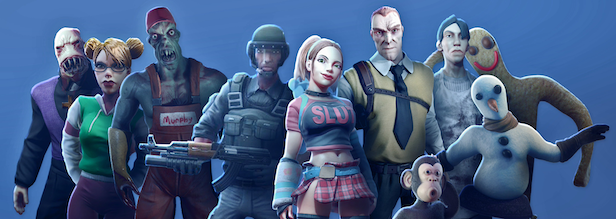
Other Examples: Spore (2008), Alpha Protocol (2010), TimeSplitters (2000).
To Find New Ways To Interact With Spaces
So games provide a space inspired by and, at the same time, unlike our own. Said space’s full of folks who bear goals, biases, and roles to play. Sounds like a world and tale one’d find in any storytelling medium. But where gaming’s concerned, that’s where the fun—i.e. audiences—comes into, well, play: Their ability to shape the story world and how they do so.
Do they criminally assert themselves in Grand Theft Auto III (2001)? Do they achieve super-powered feats in Prototype (2009)? Or do they restore color to the world in Epic Mickey (2010)? However one looks at—and does—it, games bear an alternative to how one controls themselves and shapes their environment as they go about their real lives. Digital escapism, after all, isn’t just about leaving the real world behind. It’s also about new modes of spatial awareness that can test one’s creative and abstract thinking.
Such is the promise that Superhot (2016) realizes with flying colors (and glass shards for enemy flesh). Taking place in a metanarrative involving a minimalist in-game program named superhot.exe, Superhot sees the gamer—their avatar a fictionalized version of themselves—getting sucked into a series of unconnected levels they must traverse on foot to escape the program’s clutches. Those levels host enemies in red and weapons in black, standing out from the white and gray environment.
All of this begets a fitting metaphor for Superhot‘s standing out not just from real life, but also from other first-person shooters via a twist on the genre formula: Time moves only when the player does. This compels players to think differently and tactically about how to take on one’s surroundings and leverage the space to achieve their goals with style. This is something Superhot highlights via a real-time clip of the gamer’s progress through the level upon completion.
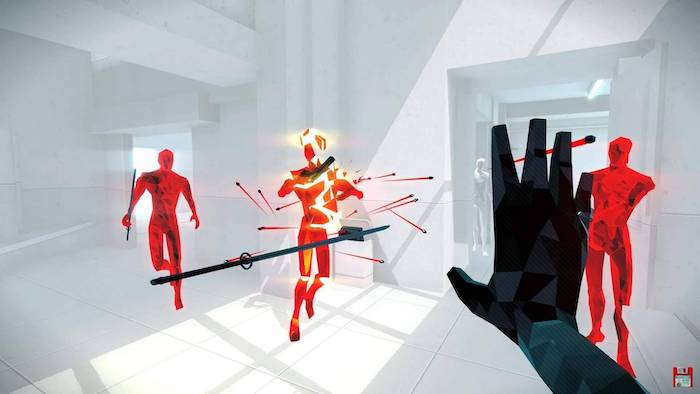
Progress’s made by thinking on one’s feet while still having a chance to analyze the space around them for gameplay purposes. Flying weapons to grab, bullet trails to dodge, enemy positions to gauge before moving out of cover… These combine to craft not just a unique shooter, but also a swell way for the participant to interact with a 3D space.
It’s a bit like how one plays chess: With foresight, circumspection, and caution.
That the player hones those three traits in a Matrix-like space bearing an emphasis on wise shooting and wiser moving is a testament to Superhot Team’s ability to embed smart thinking into play. It’s a form of play whose mechanics and rules enable navigational ingenuity, “allowing [one] to carefully align a headshot, evade a punch, or take a breath and consider how to untangle the deadly knot [one finds themselves in].” 6
Humans come with their physical and technological limits, leaving room for one to speculate about how they could, say, breathe underwater or see through walls if they had the one thing that gave them such abilities.
And games are eager to grant such (power) fantasies in imaginative worlds governed by equally creative laws of nature. This helps audiences hone a vivid imagination that keeps that foremost driving force for intellectual health and growth—curiosity—going.
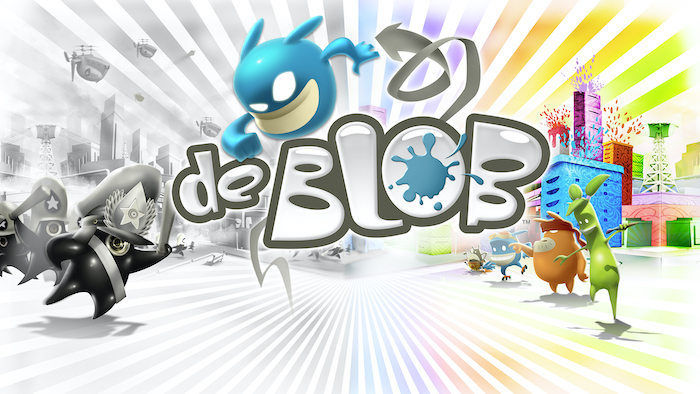
Other Examples: de Blob (2008), Watch Dogs (2014), Snake Pass (2017).
To Be Part Of And Impact A Story
Being able to interact with one’s surroundings and get “water cooler” tales out of their exploits makes for grand entertainment. The best and most indelible sort of entertainment, however, is the one that can potentially become grander if player-made stories contribute to a larger, more epic narrative.
Think of the high school hijinks one can get into with Persona 5 (2017), or of the existentialist journey the player undertakes across many planes of reality in Planescape: Torment (1999). Be it a party of chums, incredible odds, or weighty themes that underline the stakes, games offer audiences the driver’s seat with regards to guiding and making sense of the narrative.

This means that players “aren’t just shown how a conflict gets resolved, they’re [also] challenged to do [the work] themselves.” 7 And this being challenged serves as the catalyst for bringing out the good, the bad, and the innermost in the participant, boosting their level of emotional engagement.
Cue Valkyria Chronicles (2008) and its bespoke squad members who fight under the pall of warfare (and permadeath should gamers get careless). Set in the fictional land of Gallia, Valkyria Chronicles puts players in charge of the militia unit Squad 7 as it seeks to drive out the invading forces of the East Europan Imperial Alliance, which looks to seize Gallia’s natural resources.
This in turn serves as a chance for gamers to seize in terms of helping the underdog. And with the odds stacked against them, players are further incentivized to explore every avenue for realizing their heroic potential.
Bonds, for instance, can be forged with and between characters on the battlefield, leading to thrills such as getting one’s favorite soldiers to overcome Selvaria’s forces at the Battle of Barious. Players can even tackle discrete side tales to help particular squad members seek personal closure in the midst of a larger, more external conflict. Such a balance of the collective and the individual helps the game feel both epic and intimate without losing sight of the bigger picture or its finer details at any time.
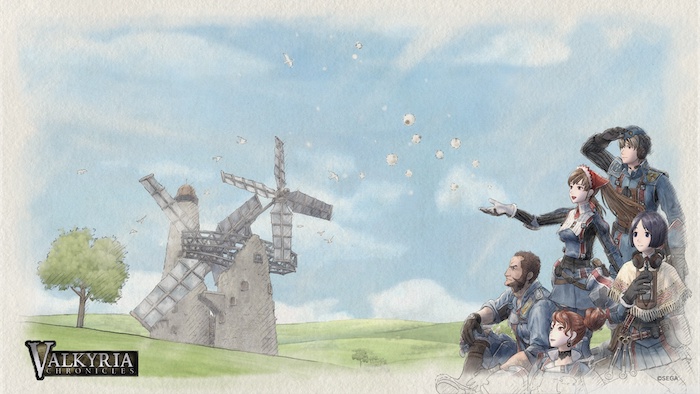
All work to produce empathy in the player. It compels them to get better not just for the sake of progress, but also for that of souls the gamer’s entrusted with. This makes Squad 7’s triumphs all the more innermost to the player, and its downfalls—plot- and gameplay-induced—all the more heart-wrenching.
Like Ghibli films, Valkyria Chronicles doesn’t mince words about human cruelty, but it leaves room for hope and change that players promote in a colorful and daunting title “more interested in cultivating human bonds than putting bullets in enemies’ heads.” 8
Every person wishes to be the hero of their own story, one that intersects with and could even influence many others. With heroism comes a sense of agency and control, which games and their stories are built upon.
Ergo, one can deem games to be a sort of dialog between developers and audiences. It’s a chance for the latter to enter the former’s world(view) and explore such a perspective from that of characters the player can have fun with and as.
More importantly, however, games give folks a chance to exercise their desire to make a difference in whichever world they find themselves in. With reality housing its fair share of rigidities in the sociopolitical scene, interactive entertainment has a way of scratching that maverick itch in the participant.
Perhaps it can even leave audiences with something to think about in terms of their place in the world and how they can best leverage it for good.
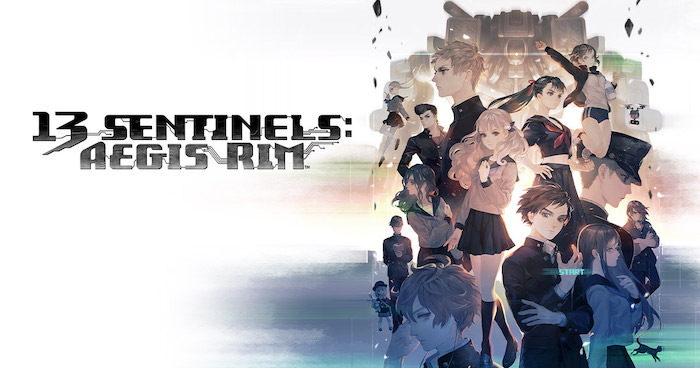
Other Examples: Dragon Age: Origins (2009), 13 Sentinels: Aegis Rim (2020), Oxenfree (2016).
To Bond And Create With Other People
With so many narratives to partake in and shape, it’s easy for one to bond with their avatar and the non-player characters they interact with. And thanks to gaming forums and social media, it’s also easy for one to share with other real-life people their virtual exploits.
Plus, with technological advances in online infrastructures and in-game creation tools such as mapmakers for designing levels, it’s possible to not only share said tales from afar, but to also craft content with others and forge “water cooler” stories with that user-made content.
On the couch or online, via competition or cooperation, with guns or pickaxes… Video games leave all sorts of options (characters, worlds, interaction modes, etc.) on the table. It’s a table to which all manners of folks—itching to make interesting choices on a global level—are invited.
Leave it, then, to the likes of LittleBigPlanet (2008) to craft a portrait of a small world. Taking place in a universe of artworks made by Creator Curators, LittleBigPlanet has the player take on the role of a Sackperson as they craft, share, and explore levels. All of this happens while a rogue Creator—the Collector—goes about stealing creations from other Curators and not sharing them with the rest of the universe.
It’s a universe that can bear sugarcane stickers, spiky fire hazards, cars sporting cardboard chassis and cheese wheels, and Dark Souls costumes for Sackpeople to don. And with everything/one coming together in the Map Editor and the level proper (without falling apart too easily), all possible PvE/PvP (player vs. environment, player vs. player) interactions may grace the aforementioned table and leave their mark on it in colorful ways.
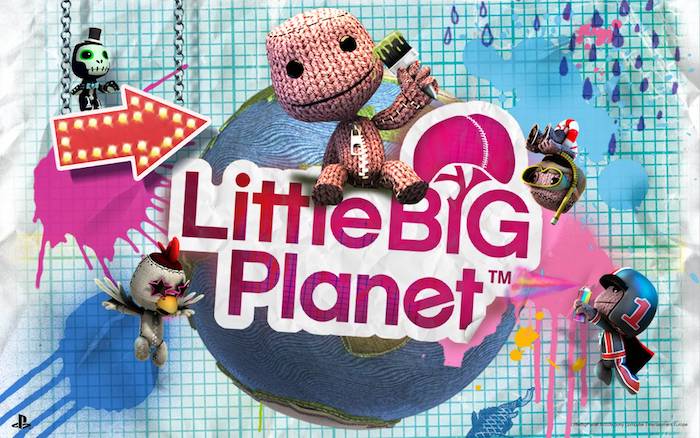
Such malleability in the experiences one can have—and create too—by themselves or with others says a lot of Media Molecule’s vision, one aimed to make players’ dreams come true in the same virtual space. It promotes the sort of proximity that invites curiosity in others and what they make.
In a world of rifts and misunderstandings, to reach out to others and offer/receive playful (and playable) works symbolizing the human imagination makes for a gift in and of itself.
Like emotions, then, play’s infectious, universal, and capable of assuming any form. It’s a task that gaming—increasingly defined by its global outreach—is happy to take on. Titles like Among Us (2018) and Fortnite (2017) even began taking center stage in pop culture thanks to how they structure their spaces and mechanics to encourage new means of social interaction. However a game includes multiplayer into its framework, the great designer sees to that task in the name of letting individuals channel their inner sculptor in a shared comfort zone where experimentation reigns supreme.
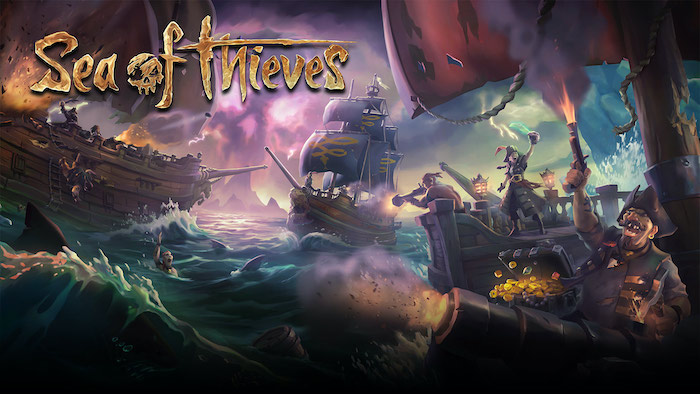
Other Examples: Sea of Thieves (2018), Don’t Starve Together (2016), Monster Hunter: World (2018).
To Creatively Channel Our Emotions
So what do the above cases for play amount to and bear in common?
As stated before, video games make for more than just mindless play, what with their sundry components—from the social to the narrative—luring all kinds of personalities to interactive entertainment. They can also have players hone their reflexes, consensus-building, abstract/creative thinking, and the like.
What makes games stand out from reality is the leveraging of skills in a contained playground. It’s a playground unshackled from real-world ramifications and, if the designer gets any ideas, physics.
Case in point? People Can Fly’s foul-mouthed and—once the gore settles—foul-smelling shooter Bulletstorm (2011). As space pirate Grayson Hunt, players find themselves stranded on the inhospitable planet of Stygia following a botched attempt to shoot down the battlecruiser of the egomaniacal General Sarrano. What ensues is a planetary game of cat and mouse that has the gamer shoot their way through feral tribes armed with guns and a cannibalistic appetite.
With the trifecta of an energy leash, mighty boot, and scoring system that puts the “skill” in “Skillshot,” Bulletstorm hardly misses a beat with its tactile take on the shooter formula. This compels players to hardly miss a shot as they take on Stygia’s fiends.
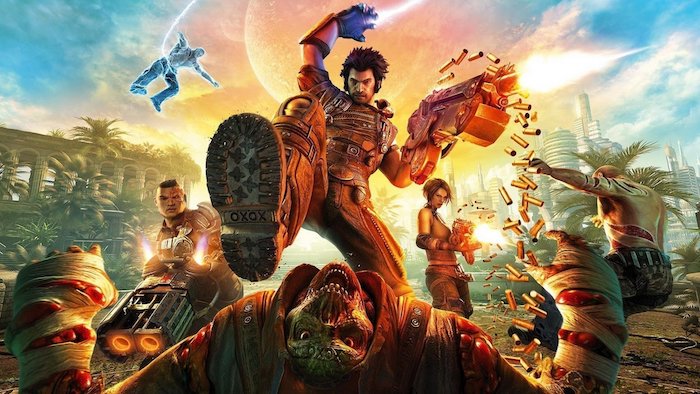
Like toys cared for by the daycare youth in Toy Story 3, nary an expense—i.e. foe—is spared in Bulletstorm. Wish to send a bomb-laden enemy into the air with a well-placed flare? Go for it. Or how about juggling an airborne foe with shotgun blasts before letting them land on a pile of cacti? Can’t think of a better way to have two kinds of pricks come together.
No doubt that Skillshots and the four-letter words that come with them bear no real-world benefit. They are more likely to raise brows than lip corners. But as a power fantasy, one in which players can creatively vent their thoughts into a fictional realm, Bulletstorm doesn’t so much scratch that discovery itch as pepper it with virtual lead.
In a medium built upon speculative fiction, the game’s imaginative ways of dealing with the opposition only seem fitting. Bulletstorm pushes players “to use the creativity of their brains for a specific purpose.” 9
Play can be more than just fun ‘n games. They can engage from a presentational standpoint as with Ghost of Tsushima (2020). They can give players food for thought like Disco Elysium (2019). Heck, they can even question the player like in Spec Ops: The Line (2012). Whatever their design goals, though, games should provide an avenue for one to exercise their agency and see the chain reactions from actions not (easily) feasible in reality.
Whether a power fantasy or empathy trip, a choreographed experience or freeform playground, games serve as a conduit for emotional release. This conduit allows players to process their feelings in a novel fashion, to control the pacing of said emotional release according to their playstyle. And as technology expands, so too will the range of possible expressions.
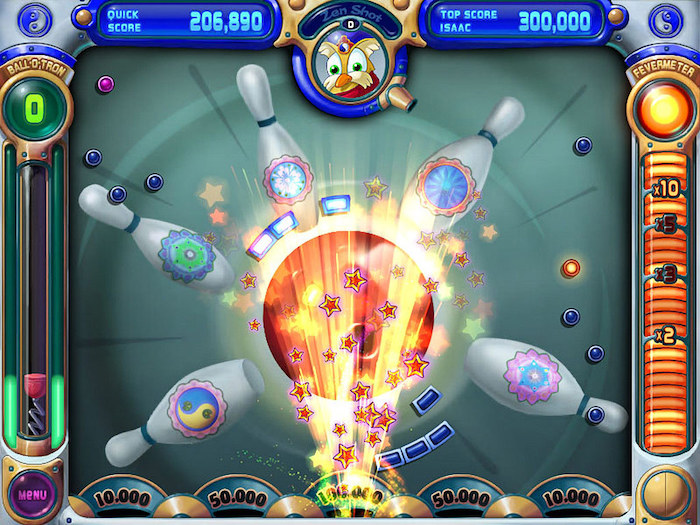
Other Examples: Pain (2007), Everything (2017), Peggle (2007).
Raph Koster once said that games were “teachers, [with] fun [being] just another word for learning.” 10 Like hiding exposition behind conflict, then, relaying smarts via play can help draw the participant into the experience. It can have them come out of the experience feeling psyched, enlightened, and psyched for more enlightenment.
Ergo, games serve as venues for welcoming others into another’s world, for putting trust in others as they uncover the virtual unknown.
Works Cited
- Brooks, Khristopher J. “As the U.S. Ages, Older Americans Flock to Video Games.” CBS News, CBS Interactive, 2 Jan. 2020, www.cbsnews.com/news/video-games-senior-citizen-video-gamers-growing-by-millions/. ↩
- Orlecki, Ryan. “Video Games As A Form of Expression.” The Toronto Observer, 12 Oct. 2017, torontoobserver.ca/2017/10/12/video-games-as-a-form-of-expression/. ↩
- Rivers, Buck. “What Garry’s Mod Is & What You Can Do With It.” ScreenRant, 18 Sept. 2020, screenrant.com/garrys-mod-steam-games-how-use-valve-assets/. ↩
- Birmingham, John. “Video Games as a Genre of Creative Expression.” The Sydney Morning Herald, The Sydney Morning Herald, 1 Apr. 2010, www.smh.com.au/technology/video-games-as-a-genre-of-creative-expression-20100401-rh8z.html. ↩
- Millsap, Zack. “Oddworld: Stranger’s Wrath Was Awesome – But It Didn’t Fit With the Series.” CBR, 30 June 2020, www.cbr.com/oddworld-strangers-wrath-unllike-predecessors/. ↩
- Plante, Chris. “Superhot Is the Unthinkable: a Truly Original First-Person Shooter.” The Verge, The Verge, 25 Feb. 2016, www.theverge.com/2016/2/25/11110138/superhot-review-video-game-pc-mac-linux. ↩
- Skolnick, Evan. “Video Game Storytelling: What Every Developer Needs to Know about Narrative Techniques.” Watson-Guptill, 2015. ↩
- Kriss, Alexander. “Valkyria Chronicles Is a Different Kind of War Story.” Kill Screen, 19 July 2016, killscreen.com/previously/articles/valkyria-chronicles-different-kind-war-story/. ↩
- Bossche, Andrew Vanden. “Analysis: High Aspirations for High Scores – Bulletstorm and How Points Change Play.” Gamasutra, Informa, 10 Feb. 2011, www.gamasutra.com/view/news/123353/Analysis_High_Aspirations_for_High_Scores__Bulletstorm_and_How_Points_Change_Play.php. ↩
- Koster, Raph. “Theory of Fun for Game Design, 2nd Edition.” 2013. ↩
What do you think? Leave a comment.











Interesting article! Video games have become such a diverse landscape, it is so exciting and fun to be a person playing games right now. There are so many wonderful creative minds creating great new experiences.
With SSDs and increased memory pools making accessibility less of a hassle this generation, I also wager that games are getting closer to striking a balance between “pick up ‘n play” and “living, breathing worlds,” which in days past clashed with one another when CDs replaced cartridges as the format of choice for storing data back in the PS1/N64 days.
As a career writer, I identify most with the need to participate in and influence stories, and the need to find creative ways to interact with spaces. A strong story and myriad ways to participate in it, where my choices actually influence the storyline, are my top criteria for participating in a game.
Storytelling in games is its own fascinating thing, with its strengths (e.g. the audience’s active participation in shaping things) and quirks (e.g. trickier to maintain a smooth pacing that serves both the gameplay and narrative). With the medium becoming more respected among the masses, it’ll be interesting to see what themes and storytelling mechanics developers will come up with this generation and decade.
With a year as tumultuous as we have all collectively had, games have truly proven how valuable they are in providing escapism. I mean, this year both Among Us and Animal Crossing have gone viral for that reason. Not only are they an outlet themselves, but so too is talking (and making memes) about that outlet.
Interesting article 🙂
As I’ve said to Sean beforehand, the use of SSDs and faster, enlarged memory pools means that the gap between the player and the world they wish to become part of will grow slimmer. This enhanced seamlessness will also likely compel developers to rethink the way they design their virtual environments and systems to make things feel more cohesive and reactive to the player’s action without burdening the systems the games run on.
Gone are the days when nearly all games used to be niche, technical ventures where you needed years of experience to even get started in the game.
There’s a style of game out there for everyone now, I whittle away most of my game time playing games like Factorio and Civilisation, slow cerebral games that can be played solo or with friends. But any sort of setting and game type you want is probably available for you right now.
So many people don’t start up because they think they A) won’t know how to start or B) their interests wouldn’t be represented in a game and that’s never been further from the truth!
One problem with video games is they can be a real time sink as they can be very addictive. 77 hours per year, or 3 hours per session, is a lot of time to be playing a video game. As a comparison you can (apparently) learn another European language within 400-500 hours. It would be great if these games could combine education within them.
Define useful? Because I’ll tear through medieval/renaissance trivia due to a slight obsession with strategy games set in those periods.
Plenty of puzzle games that work a variety of cognitive processes, far more than sudoku or anything else could do at once.
Also, you’d be surprised how much games like Factorio help me with programming learning. The process of dealing with the journey of information and it’s interaction with logic gates is identical, but the different way of looking at it is great for the mind.
TV, films, books… all real time sinks with as much learning potential.
There are plenty of games where you’ll learn stuff but we do not need to cram learning into everything we do.
But video games are entertainment, so it’s not fair to compare them with learning a language, compare it to watching TV or going to the pub.
Learning a European language is likely to be both boring and completely worthless. Why not spend the time doing something enjoyable?
Games teach you it is OK to ask for help.
Combining everything will meaning is a symdrone of modern illness. After all, what does our life matter? Gaming is interesting while learning such things may seem more like a torture.
I often miss being consistently brilliant at Battlefield and I once considered myself to be an adult gamer, but now…now I’m just an adult. *sniff*
I was once happy to pay a yearly subscription to play online and would gladly pay top dollar for a AAA game. That was a few years ago. Now it seems you pay top dollar for part of a game and continue to pay throughout the year. Failure to do so will result in access to parts of the game being denied and/or a grossly unbalanced multiplayer experience. I’ll stick to Fallout or any Bethesda game for that matter… and Football Manager.
Fallout and Bethesda have some of the worst DLC policies in the business, need I remind you of horse armour?
If you play on a year time lapse and only buy things when they hit ten or fifteen quid, you’re laughing. By that point they’ve fixed all the bugs and they often come bundled with extra content. Or just buy £5 indies that are good for a few hours. Or buy old games. Or wait for a Steam sale on PC. A lot more options than a tenner for a DVD or cinema visit…
Good video games also encourage sobriety (you try winning a race in Morza Horizon after a few drinks) and insomnia (finally gets to end of level, glances at watch – it’s 03.30!).
Best of all, after investing weeks of your life in a really hard game you defeat the end-of-game boss, the credits roll and you realise that you’ve wasted all that time…
Loving Forza at the moment, it’s so gloriously over the top, yet keenly attuned to racing detail.
One thing it has made me aware, how easily I could kill myself if I sped around in a car. One quick look at the radar for a split second and I can fling my car off the road because I was going too fast.
Gaming and Drinking do not mix, so I just get really stoned instead.
Don’t get that, if it’s time you’ve enjoyed spending doing something (be it reading a book, watching a film, show, listening to music, whatever), and it didn’t negatively impact on other needs (family life, etc) then it’s never wasted.
In our house, Gran is particularly fond of Goat Simulator. She enjoys the anti-social behaviour element of it and of course has empathy with all that facial hair.
My mum is nearly 70 and is amazing at first person shooters on her PS4.
But we had to take the headset off her because she was getting a bit sweary when shouting at the teenagers she’s pwned. And dad was worried about her blood pressure.
I think she’s the one who keeps beating me in Overwatch.
As a young child it was the birth of video games. I loved playing on my friend’s Atari, and then my Dad got a Vic-20 with a 32k expansion pack and I was away, playing chess at six, Blitz, Jetpac etc. Then it was onto a spectrum and Atari. That’s when Driller came along, the first excursion into 3D, with a little bug that meant it was impossible to complete the game unless you found a little hack!
As an adult I have no time for games, and little inclination. I must be becoming an old fuddy-duddy as the same sorts of 3D shoot ’em up and driving games no longer floats my boat. A few innovative things pop up now and again, but the golden age of invention seems to be past. These days I’d rather read, paint, walk or grow some vegetables.
What?! There are so many brilliant new games coming out these days that are redevelopments of tried ideas in new ways, or are novel concepts!
What sort of thing would you be interested other than just innovative
A might be tempted by a new Monkey Island release!
My girlfriend absolutely despised video games until I mentioned I have the reworked version of Monkey Island installed on my Xbox 360 (she’d played the original as a kid). She played the newer version through in the space of a weekend in a mix of delight and swearing her head off when getting stuck fast solving some of the puzzles. When she finished it she returned to despising video games again.
I’m a Twitch streamer so I play a lot of games – broadcasting from PS4. Broadcasting on Twitch means playing becomes a real social activity, and regulars in my chat are there to see each other, rather than just to directly chat to me. It’s great fun – and if I get stuck I can ask for help. Although general etiquette is not to tell me what to do until I ask!
Best of all, games give you that satisfying feeling of a job well done, without actually doing anything.
In the end though, what is a job well done? If I get a pat on the back for a job well done in my real life job as a senior transponster, is that of any consequence really? I’d say for most people the value of their achievements is all pretty subjective.
Basically what I’m trying to say is that completing the water temple in Ocarina of Time IS a real achievement. Please, for the love of god don’t take that away from me.
My son used to play Ocarina of Time and the other Zelda games on his game cube and I used to watch for hours (well, half an hour at a time) – lovely stories, delightful graphics – I’ve always said I’ll start to play when I retire but I’m afraid my reaction times are far too slow, so it could be pretty frustrating.
The first time I conquered Europe in Empire: Total War….
I have noticed a great improvement in fine mobility, better coordination and better spacial orientation. A friend of mine, of my age, that doesn’t play videogames, almost failed his driving test, because he could not pass the coordination exam. I passed without problems.
What games have you been playing?
Flight simulator, first FSX and now the version sold by Lockheed Martin called Prepared or P3D, which is more stable. For that you need a yoke and pedals or a joystick. Marvelous to train you in fine mobility and spacial orientation.
Xcom – Enemy Unknown a great strategy game about fighting an alien invasion. Great for planning and reasoning skills.
The wife and I sometimes watch University Challenge and try to get some of the answers. Recently there was one round where you had to name some specific counties in the Netherlands. Thanks to countless hours I spent on EU4, I got Friesland and Zeeland. I always knew invading them as France would bring benefits in the long run.
Video games are great, the problem i’ve found and the reason I tend to steer clear, is the sheer ease at which you find yourself playing til 6am in the morning without realising, and unfortunately sitting at home in my pants eating biscuits doesn’t pay as well as my job.
And one day you will find your self 60 and look back at a life of complete sameness of escapism rather than living.
I’ve stopped playing CoD with my son. He wipes the floor with me every time.
Can anyone advise on what to do when you become a bit bored of gaming? I apparently play about 15 odd hours a week according to Steam, but I’m never really too enthralled by them as of late.
Can’t say I’ve ever experienced that problem! I’ve become bored with individual games but never gaming itself. Maybe try a well-regarded game in a genre that you don’t usually play? Or is there a Steam equivalent of PlayStation Plus, where you get some “free” games that you wouldn’t have dreamed of buying, but which turn out to be really good?
Or just knock the gaming on the head for a few weeks until you feel like going back to it. 🙂
Sometimes all I want to do is explore games. Other times all the games I have can’t inspire me or excite me or engage me at all. Comes and goes in phases. Sometimes all I want to do is binge awesome TV. Other times I’m hooked on books. And sometimes all I want to do is build an island in Tropico or stomp around The Witcher 3.
Don’t force yourself to like games if you’re not in the mood at the moment. Do something else until you get the urge again.
See if there’s a group in your area that facilitate playing with people in person?
Couch/local multiplayer is much rarer these days but brilliant fun.
Take up a sport or take a dancing class etc to meet some new people.
Read a book.
The (albeit, fading) stigma around video games still perplexes me.
We live in a highly technological world, and understanding interactive systems including games and stories is becoming a more and important.
Beside which, some modern video games offer incomparable narrative experiences. Playing ICO or The Last of Us 1 & 2 without feeling some kind of emotional response would be hard.
The opening scene in the Last of Us had me blubbing. While not the most innovative gameplay it is by far and away the best video game I have ever played in my 30 years of playing video games.
Naughty Dog do a the most “film-esk” games, but I wouldn’t say they are the most effecting I’ve played, although the Last Of Us certainly had it’s moments. Papers Please was really good in that I learnt a lot about myself and how easy it is to become corrupt when the correct pressures are put on you.
I love video games. I can’t wait to see what comes next, and one of my biggest fears regarding ageing is when I lose the motor control to play on.
I’m an older woman who’s been playing video games most of my life and more so the last 10 years. My life has been hugely enriched by gaming, I have friends all over the world and in fact I found my current job and my current husband in video games…yes, really.
I’m a 51 year old bipolar lady. Been gaming through the XZ81,Amiga,PS1,2,3,4 and Pro, Vive, PSVR route. When my mood is up games make me concentrate on something outside myself, and when I’m down I have a shooting contest with Garrus at the top of the Citadel. My happy place.
A very underrated aspect of dialogue or text heavy games is their amazing potential for language learning. I have played The Witcher 3, Skyrim, and the Fallout series in French, Spanish and German and they have been hugely useful for training my ear (and for teaching me some ridiculously niche vocab). These kind of games expose you to a huge amount of spoken and written language within its proper context, so it can be often more effective than passively watching films or listening to the radio. Sure, sometimes the dubs are bad, but sometimes they are even better than the originals – I can’t imagine playing the Witcher 3 without my world-weary French Geralt, and German just feels so right for the cantankerous Nords of Skyrim.
Games can also provide a format for exploring complex models of the human world, giving insights into historical choices and future alternatives.
For example, gaming World War 2 in Hearts of Iron (various versions) shows just how great the contributions of Britain’s colonies were when some say Britain “stood alone”; the strategic importance of bottlenecks like the Suez Canal are made so obvious; and the vast size of Africa, the populous regions of China, and the extent of the USAmerican empire in the Pacific are put in accurate scale.
However, for all the requirement of game balancing to play underdogs, there are some glaring gaps in scenarios. Why is it so hard to find a game where you can lead a Caribbean slave revolt, or a colonial freedom struggle, or experience civilian life in a war zone, or play a woman trying to commute safely back to her kids through a hostile city?
I love the medium. I love the challenge, and more than anything, overcoming that challenge. From a memories perspective, there are parts of VGs that will stay with me forever and are at least as potent as some TV or Movie scenes. I’ve also fantastic memories of playing with friends, although mostly in the same room as I’ve never really enjoyed online play.
I have spend about 25 years playing games. And since a couple of years I have suffered from gaming fatigue. I can’t literately pick up a game anymore, I really feel I have seen that and done that before. And you know what, that’s fine. Now I have a lot more time to pursue other aspects of life, like running.
I’m now 44 and find I’ve been playing video games in some capacity since pretty much the inception of the medium. Sometimes I’ll go for years without playing, and then sometimes I’ll get the bug and complete 10 games in a couple of months. Nowadays with work and time constraints I’ll probably only play 5 or so different games a year, but I get to chose the best or at least a good variety.
‘Games’ or interactive entertainment *is* the medium of the future and naysayers are just going to look a little silly before long.
To be fair to the naysayers though there have been a lot more shooters and racers and candy crushes than Icos, Last Guardians, Firewatches… over the history of video games and the media has been happy to sell that story. But that is blinding you to the truth and what games are increasingly offering and will offer for education and mind expansion and escapism (why not).
Like any medium there are good games and bad games, you can’t judge all movies according to plan 9 from outer space, all books according to mein kampf (sorry 🙂 or all TV according to Strictly (not sorry).
I absolutely judge all games by the standards of meinkraft, it’s great.
I’m always willing to laugh at the nerdy stereotype of games but it has been amazing to see how they’ve diversified over the last few years. I love being able to play big loud games like GTA and CoD to more contemplative stuff like Life is Strange and Firewatch. I can play football in FIFA or run a farm in Stardew Valley.
I appreciate some people will never enjoy games and that’s fine,but I don’t think there’s ever been such a wide variety of games out there that so many different people could play.
One feature of video games that I have noticed is that at their best, they are a unifying force akin to the old board games, card games, parlor games, et cetera. For this, it would seem to me that a Fortnight or HOI4 or something like that would be very good for such social engagements.
Games used to (~10 years ago, when it was the PS2 and XBox) be far more likely to have offline multiplayer. Unfortunately, as the newer generations have better internet access, game makers realised that if they have no offline multiplayer, they can sell as many copies of the game as there are players, and so nearly all games only have an online multiplayer option. To see generic racing games have no offline multiplayer was a very sad indictment of the state of things.
I’ve never found online multiplayer anywhere near as social as offline – I miss evenings where you get yours mates round for some fun games & a takeaway. And since I refuse to pay for access to online gaming, even that avenue is closed. So overall, I think the social element of gaming has declined a significant amount in the last decade.
Agreed. Lego Star Wars split screen on the Wii was how I started playing with my son. Moved on to Halo 3 on Xbox and i’ve been looking for couch co-ops ever since but they are getting rare. Which is a shame.
I recommend giving Steam a browse for some great PC couch co-op titles.
I love books and movies and I never struggle to find something great to watch or read. However video games provide many more “wow, that’s brilliant!” moments for me.
What books and films require of you is much the same way all of them: following the plot, relating to the characters, some knowledge of the real world and other films/books are generally all that’s required.
With games you never quite know what they’re going to require of you. Sometimes you have to make difficult decisions, sometimes you have to have good reflexes, sometimes you have to solve problems, sometimes you just walk around an environment and admire the graphics. There’s always something new and there isn’t a single feature that’s common to all of them – even basic things like interactivity, skill or graphics don’t always feature. For me that keeps them a lot more fresh and interesting than books and films.
Totally agree about everything in this article. The image of gaming is changing though as generations grow up with them and know the truth about them and as they do indeed become more sophisticated.
I think eSports will also become more mainstream and we will see games becoming ever broader in definition and challenge. There will always be demand to shoot things, and sometimes that’s ok too but games are much more than that. Really also they are a better medium surely than passive TV or movie watching. Games and play are also really about learning and I think we will see that become apparent and leveraged ever more too. People don’t realise that’s what makes games fun, even ‘repetitive’, ‘addictive’ time-wasters like Candy Crush indeed.
Addiction fades once the game is ‘learned’ so it’s an entirely different type of addiction, learning is fun, even when it’s obsessive compulsive.
There isn’t always a direct connection between videogame life and ‘real’ life, but I do find some videogames provide rich entertainment that is emotionally stimulating (like a novel), whereas problem-solving in games does have some positive correlation with seeing RL situations differently – think there was a study on this in the past couple of years.
As much as I enjoy modern da video gaming, specifically for how insane the graphics have become nowadays, there does exist this peculiar and immensely nostalgic emotion that I engender whenever I decide to dust off my older generation consoles. It’s unique, and by definition you’re not going to receive that experience from anywhere else. Regardless of the era, there’s a subjective involvement you have when you catapult yourself into this separate reality there’s extremely difficult to articulate.
What I find is your constantly looking to upgrade your hardware to keep up with the high end graphics. I find the graphics incredible on todays games.
I predict the evolution of gaming to be the most radical in the history of entertainment. As the technology used to create and facilitate them becomes ever more advanced and varied, the number of possibilities goes far beyond the mediums (films, book, etc.) which predate them. Thus, the number of reasons one may have to immerse themselves in gaming will become neigh-impossible to count. It’s an exciting prospect to witness!
With the new generation of consoles out now, will these bring any new levels of enjoyment to games? Or more of the same?
Excellent article. As a lifelong gamer, I am fascinated with the gaming industry and its evolution, and the impact it has had in mainstream culture and education among other areas.
Very interesting article. Gaming has evolved very much, and the need for new content in certain categories always leaves players wanting for more out of their games.
As someone who enjoys RPGs, I love a lore filled story, full of little details and the big that create the world that tries to immerse me.
Great insights on video games. I definitely agree on the part that video games are essential to channel our emotions and also to be team player.
As a future educator, I want to explore the idea of analyzing video games in the classroom as one would with a piece of literature. I would love to create lesson plans on author’s (or in this case, developer’s) message, and how stylistic choices and gameplay elements contribute to that message that the game is trying to promote. A game in mind would be Celeste, as it is accessible to a wide variety of students with its ability to ease the difficulty along with other accessibility options, is appropriate for the classroom with its E rating, and conveys a story of overcoming obstacles and self identity, themes relatable and inspiring to young students.
What’s so funny is the stereotype behind being a ‘gamer’ or someone who plays games. There are people who spend a lot of their time consuming media/tv shows/movies for hours on end and as soon as they hear someone spends their time playing games, there’s a negative emotion behind it – especially as a woman. I’ve actually tried to deny my love for gaming because of other women around me who cannot believe it could be worth anyone’s time, other than children who do not have real-life responsibilities. It’s impossible. Playing games make me genuinely happy and I can spend as much time doing it and still feel happy about myself, it’s just weird to think people who do not play games think of it so negatively. Amazing article by the way!
Video Games are such a unique medium that, as of late, has felt like a marketing scheme for TV shows…
I love video games, that are on CD or cartridge as in old school. No internet connection. Video games are a way to disconnect from reality and go into another world without leaving the planet.